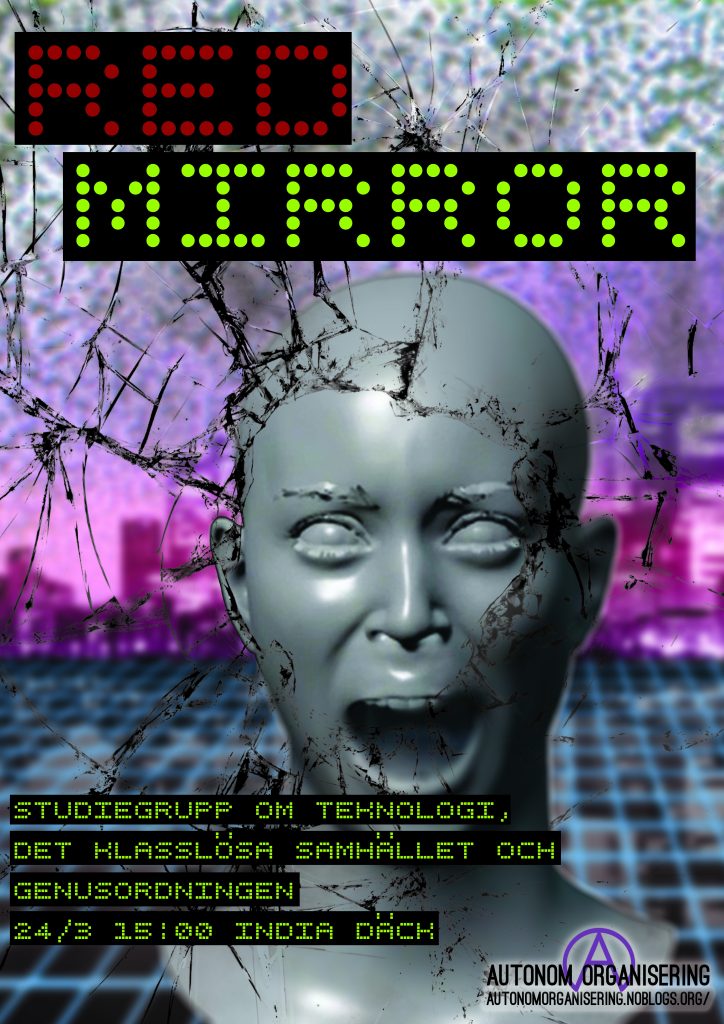Red Mirror 2
These are some of the things we discussed at the first Red Mirror event. The second event will be on the 7th of April at 15.00 at India Däck, Stora Algatan 3. Further down we give a summary of our discussion.
Our goal is to make Red Mirror entirely self-organized and we are taking steps towards doing that. For our next event we will do two things.
1: Watch “Humans Need Not Apply” beforehand. We decided that we wanted to watch it individually first so that people had more time to reflect on it. However, we will also show it during the event.
2: We will do a self-investigation during these two weeks until the next event. Thus, we encourage everyone to consider how technology affects their own lives, specifically in three different ways:
a) At your work.
b) When you are being digitally surveilled (by social media for example)
c) How the logistics of the economy affects you (such as the coffee you’re drinking relying on a vast capitalist logistic network to get to your home).
3: We also discussed a few other possibilities more loosely and we are going to invite some human ecologist Marxists from Lund University to other events, if one has time then reading “A Manifesto for Cyborg Pedagogy” would be helpful and we also discussed doing an entirely online discussion but didn’t find a very viable forum for it. We also discussed going to “Blood Batteries: the dark side of renewable energy?” event. We will have these things in mind for the future.
Discussion Summary
We divided into several smaller groups that each focused on different topics and then re-assembled to discuss these together. This is a brief summary of these discussions in no particular order.
- Control over our working time digitally through apps, smart systems and “digital stopwatches.”
- Technology is a management tool, it forms and controls our work.
- Our whole reproduction when we are outside the sphere of production is measured and sold through social media. We become products that gain value for companies by posting images on social media. The division between work and free time thus collapses
- In China there is a new “point system” that measures the online activity of citizens where citizens are given demerits if they are criticizing the state. Will this spread?
- Automation will take place, but how quickly? Personal experiences of different people’s jobs corroborate the idea that automation is happening fast. But what exactly can be automated?
- A major issue is that our society is Lutheran and worships work, even as there are fewer jobs being unemployed is seen as bad.
- It’s absurd that politicians “create jobs”: why should we need to work if we don’t have to?
- Should we aim for a fully automated communist society or are there some issues with this? Should we be doing propaganda with this in mind?
- Viewing automation through the lens of Marxist crisis theory. Crisis develops out of contradictions within capitalism and automation is one example of this.
- What happens if we lack energy sources in the future?
- Devastation of agricultural soil: in Lund the construction of the energy accelerator MaxLab is one example of destroying agricultural soil that requires more than a century to replenish. Perhaps struggling to make sure that farmland will not be built upon will become more important in the future?
- It’s not so cool to be Luddite, but we can’t just rely on technology to fix things such as agriculture. The problem is in the technology we use. Other examples is that building green cars or environmentally sound phones hurts the environment through the construction of these things.
- Basic Income: Is it a way for capitalism to survive (like in the sci-fi series the Expanse) where everyone will get a low wage but have no job and no future? Or is it a liberatory possibility where people will be free to be creative? Is there a tension between wanting this now and wanting a true communist society?
